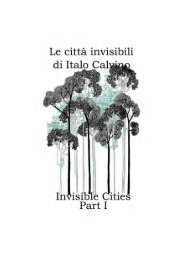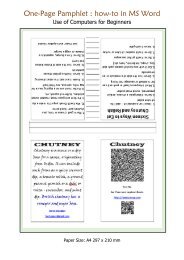Footnote to Rebecca
At the end of Daphne du Maurier's novel Rebecca, we do not know what became of the young girl who narrates the story; nor do we know what happened to the sinister housekeeper Mrs Danvers. This is the last word of Rebecca - twenty years after.
At the end of Daphne du Maurier's novel Rebecca, we do not know what became of the young girl who narrates the story; nor do we know what happened to the sinister housekeeper Mrs Danvers. This is the last word of Rebecca - twenty years after.
You also want an ePaper? Increase the reach of your titles
YUMPU automatically turns print PDFs into web optimized ePapers that Google loves.
San Paper and Layabout Books<br />
www.sansap.com<br />
san2paper@gmail.com<br />
ZINE<br />
Chapbook
I started my tale of <strong>Rebecca</strong> with<br />
the last line at the beginning: Last<br />
night I dreamt I went <strong>to</strong> Manderley<br />
again. Yet, my s<strong>to</strong>ry is not quite<br />
done; there is a footnote <strong>to</strong><br />
append—the true last word.<br />
Who might care <strong>to</strong> read it? No one,<br />
I suspect. No one will read this. I<br />
know no one. Did I ever? I never<br />
had friends of my own but kept up<br />
appearances of friendship <strong>to</strong> please<br />
Max. Now there is no one <strong>to</strong> please<br />
or impress, so I please myself - here<br />
where I linger alone on this almost<br />
island of Desenzano which appears<br />
filled with rag dolls. Indeed,
fashions in clothes may change but<br />
the people inside them never do.<br />
It is the festival of Carnevale. Shall<br />
I wear a mask and pretend <strong>to</strong> be<br />
young again?<br />
I look across the lake from my<br />
balcony. Snow is withering on the<br />
Alps in a glitter of cold decay. The<br />
word 'yesteryear' comes <strong>to</strong> my<br />
mind.<br />
'Colazione,' announces Marta the<br />
housekeeper. Francesca, the new<br />
domestic girl, serves rolls and<br />
frothy coffee clumsily. I eat little<br />
these days and cannot sleep.
What is the note I meant <strong>to</strong> add? It<br />
is trivial but puts my mind at ease.<br />
Max brought me here. Count<br />
Galeazzo Ciano, who insisted we<br />
call him Gian, became a friend. Life<br />
passed in a whirl of amusement.<br />
Even the War did not distract us at<br />
first. Then Gian fell from power<br />
and Max <strong>to</strong>ok <strong>to</strong> binging drink.<br />
He would not have lasted long on a<br />
diet of gin. A bullet from a<br />
communist spared him his final<br />
decline. Like <strong>Rebecca</strong>, he feared a<br />
lingering death. I became a widow<br />
and kept a small portion of my
estate but the villa was seized. My<br />
circumstances are modest. I do not<br />
repine. Here I am and here I stay<br />
for the duration. There is nowhere<br />
else <strong>to</strong> go. There is no one I know.<br />
Looking across the lake at that land<br />
of cuckoo clocks, I remember the<br />
head of the Swiss National Bank<br />
who observed: 'When you have<br />
money, there is nothing <strong>to</strong> say; and<br />
when you do not, there is no one <strong>to</strong><br />
talk <strong>to</strong>.'<br />
The note - the promised footnote -<br />
it is neither a revelation nor a<br />
resolution. It is a brief encounter
after the War.<br />
I saw a group of concentration<br />
camp survivors arrive <strong>to</strong> be trucked<br />
<strong>to</strong> a resettlement centre for<br />
Displaced Persons. An older woman<br />
stared at me curiously. I recognised<br />
her. She was much changed but<br />
clearly the dark housekeeper of<br />
Manderley, Mrs Danvers, the last<br />
person in the world I knew; but I<br />
had not known she was Jewish.<br />
Without thinking I blurted out<br />
'Danny!' She stared back at me<br />
savagely. I did not know what <strong>to</strong><br />
do. 'Can I help in any way?' I asked<br />
foolishly and reached for my purse.
She dismissed me with a sneer.<br />
'Unlike you, I have not led a sad life<br />
- though lonely, perhaps, since<br />
<strong>Rebecca</strong> died. I was brought up <strong>to</strong><br />
expect little and am not<br />
disappointed.'<br />
She climbed in<strong>to</strong> the back of the<br />
truck and disappeared. I knew I<br />
would never see or speak <strong>to</strong> her<br />
again.<br />
Stephen Colbourn<br />
2022
Who was <strong>Rebecca</strong>?<br />
<strong>Rebecca</strong> is a 1938 Gothic novel<br />
written by English author Daphne<br />
du Maurier. The novel depicts an<br />
unnamed young woman who drifts<br />
as a lady’s companion in upper class<br />
circles at Monte Carlo.<br />
She impetuously marries a wealthy<br />
widower named Maxim de Winter<br />
who is twenty years older than<br />
herself. At his country house<br />
Manderley in Cornwall she<br />
discovers that both he and his<br />
household are haunted by the<br />
memory of his late first wife, the<br />
title character <strong>Rebecca</strong> whom Max<br />
may have murdered.
Last night I dreamt I went <strong>to</strong><br />
Manderley again . . .
















